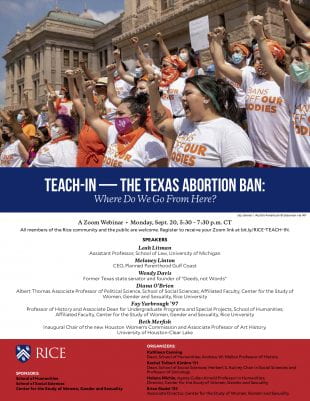HOUSTON – (Sept. 17, 2021) – The nation turned its attention to Texas Sept. 1 as Senate Bill 8 went into effect, banning abortions after cardiac activity is detected and delegating enforcement to citizens.
A webinar featuring prominent supporters of reproductive rights will discuss the history and legal precedents behind the new law as well as the impact it will have on Texans, Roe v. Wade and reproductive rights across America.
“The Texas Abortion Ban: Where Do We Go From Here?” will be held via Zoom Sept. 20 at 5:30 p.m, sponsored by the schools of Humanities and Social Sciences and Rice’s Center for the Study of Women, Gender and Sexuality (CSWGS).
A lineup of well-known reproductive rights experts and Rice professors will each speak for 5-7 minutes, with rounds of questions from the audience to follow. Speakers will include, in order:
Leah Litman, assistant professor, University of Michigan School of Law
Melaney Linton, CEO of Planned Parenthood Gulf Coast
Wendy Davis, former Texas state senator and founder of Deeds Not Words
Diana O’Brien, Albert Thomas Associate Professor of Political Science; affiliated faculty, CSWGS
Fay Yarbrough, professor of history and associate dean for undergraduate programs and special projects, School of Humanities; affiliated faculty, CSWGS
Beth Merfish, inaugural chair of the Houston Women’s Commission and associate professor of art history, University of Houston-Clear Lake
SB 8 allows citizens to sue clinics and others who violate the law, awarding plaintiffs $10,000 for each successful suit filed under the new law. Critics say SB 8, the most restrictive abortion law in the country, is vaguely written, causing confusion over its legality and panic over its implementation.
“We wanted to do something to allow students, faculty, staff and interested members of the community to come together and puzzle through things we don’t yet understand, including the implications of the law and other big questions,” said Dean of Humanities Kathleen Canning.
Canning co-organized the teach-in along with Dean of Social Sciences Rachel Kimbro, CSWGS Director Helena Michie and CSWGS Associate Director Brian Riedel.
“We felt it was important to respond to the law, and to our students’ and colleagues’ questions and concerns about it, as soon as we could,” said Kimbro. “We are delighted that so many leading experts and activists wanted to join the event.”
“The Texas Abortion Ban: Where Do We Go From Here?” will be held Sept. 20, 5:30-7:30 p.m. It will be free and open to the public. Anyone can register online for the Zoom webinar.
-30-
Related links:
High-resolution image for download: https://news-network.rice.edu/news/files/2021/09/Texas-Abortion-Law-Teach-In-flyer.jpg
This news release can be found online at news.rice.edu.
Follow Rice News and Media Relations on Twitter @RiceUNews.
Located on a 300-acre forested campus in Houston, Rice University is consistently ranked among the nation’s top 20 universities by U.S. News & World Report. Rice has highly respected schools of Architecture, Business, Continuing Studies, Engineering, Humanities, Music, Natural Sciences and Social Sciences and is home to the Baker Institute for Public Policy. With 4,052 undergraduates and 3,484 graduate students, Rice’s undergraduate student-to-faculty ratio is just under 6-to-1. Its residential college system builds close-knit communities and lifelong friendships, just one reason why Rice is ranked No. 1 for lots of race/class interaction and No. 1 for quality of life by the Princeton Review. Rice is also rated as a best value among private universities by Kiplinger’s Personal Finance.

